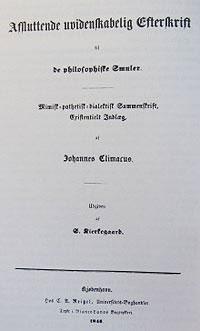
Back پایاننامه غیرعلمی پسنوشتههای فلسفی Persian Päättävä epätieteellinen jälkikirjoitus Finnish Post-scriptum aux Miettes philosophiques French Postilla conclusiva non scientifica alle briciole di filosofia Italian 철학적 단편에 부치는 비학문적인 해설문 Korean Post Scriptum Final não Científico às Migalhas Filosóficas Portuguese
This article has multiple issues. Please help improve it or discuss these issues on the talk page. (Learn how and when to remove these messages)
|
 Titlepage, first edition | |
| Author | Søren Kierkegaard |
|---|---|
| Original title | Afsluttende uvidenskabelig Efterskrift til de philosophiske Smuler |
| Translator | David F Swenson and Walter Lowrie, Howard V. Hong and Edna H. Hong, Alastair Hannay |
| Language | Danish |
| Series | First authorship (pseudonymous) |
| Genre | Philosophy |
| Publisher | University bookshop Reitzel, Copenhagen |
Publication date | Feb 28, 1846 |
| Publication place | Denmark |
Published in English | 1941 |
| Media type | Hardback |
| Pages | 630 (Hong translation) |
| ISBN | 978-0691020815 |
| Preceded by | Stages on Life's Way |
| Followed by | Two Ages: A Literary Review |
Concluding Unscientific Postscript to the Philosophical Fragments (Danish: Afsluttende uvidenskabelig Efterskrift til de philosophiske Smuler, more accurately translated as Concluding Unscientific Postscript to the Philosophical Crumbs) is a major work by Søren Kierkegaard. The work is an attack against Hegelianism, the philosophy of Hegel, and especially Hegel's Science of Logic. The work is also famous for its dictum, Subjectivity is Truth. It was an attack on what Kierkegaard saw as Hegel's deterministic philosophy. Against Hegel's system, Kierkegaard is often interpreted as taking the side of metaphysical libertarianism or free will, though it has been argued that an incompatibilist conception of free will is not essential to Kierkegaard's formulation of existentialism.
The Postscript is a sequel to the earlier Philosophical Fragments. The title of the work is ironic because the Postscript is almost five times larger than the Fragments. The Postscript credits "Johannes Climacus" as the author and Kierkegaard as its editor. Like his other pseudonymous works, the Postscript is not a reflection of Kierkegaard's own beliefs. However, unlike his other pseudonymous works, Kierkegaard attaches his name as editor to this work, showing the importance of the Postscript to Kierkegaard's overall authorship.